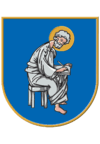Pecherskyi District
| Pecherskyi District Печерський район | |||
|---|---|---|---|
| Raion | |||
 | |||
| |||
 | |||
| Coordinates: 50°25′14″N 30°32′58″E / 50.42056°N 30.54944°ECoordinates: 50°25′14″N 30°32′58″E / 50.42056°N 30.54944°E | |||
| Country |
| ||
| Region | Kiev | ||
| Established | 1945 | ||
| Subdivisions |
List
| ||
| Government | |||
| • Governor | Serhii Suschenko | ||
| Area | |||
| • Total | 27 km2 (10 sq mi) | ||
| Population | |||
| • Total | 126 200 | ||
| Time zone | EET (UTC+2) | ||
| • Summer (DST) | EEST (UTC+3) | ||
| Area code | 38044 | ||
| Website |
pechersk | ||
Pecherskyi District (Ukrainian: Печерський район) is an urban district of Kiev, the capital of Ukraine. It line within the eponymous historical neighborhood, while also including some other historical areas. The Pechersk (Ukrainian: Печерськ, Pechers'k) neighborhood is located on the hills adjoining the right bank of the Dnieper River. The two geographic entities are often confused together. The Pecherskyi District can be considered as the very heart of Ukraine.
History
Pechersk is one of the most important cultural areas of Kiev, the location of the legendary Kiev Pechersk Lavra (Kiev Monastery of the Caves), from which it received its name (Pechera is the Ukrainian for "cave"). The settlement near the Lavra has formed sometime in the 12th century. It was reformed out of the historical Berestiv royal estate (Kniazhe selo) that was adjacent to the Kiev Golden Gates (Zoloti Vorota). Beresta is a local name of the bark of a birch tree which at that time was utilized in making of shoes as well as used as a writing medium. The settlement was renamed into the town of Pechersk sometime in the 16th-17th centuries.
In 18th century through mid-20th century Pechersk as a settlement became the administrative center of Kiev city when there was erected the Old Kiev fortress which has been a major military stronghold of the Russian Empire and later Soviet Union. Because of that new neighborhoods and areas were added to its direct administration. When in the 1840s, the New Kiev fortress was built Pechersk incorporated the settlement of Vasylkivska Rohatka (Vasylkiv's Fork) that was founded in 1706. The Vasylkiv's Fork was located in the vicinity of Citadel street where the Vasylkiv's gates once stood (today's address at 3 Citadel street).
In January 1918 the neighborhood was the center of the Arsenal Factory Uprising which later after its extinguishing led to defeat of the Ukrainian National Forces surrendering the city of Kiev to the Russian Soviet forces which were led by Colonel Mikhail Muraviov. The rebellion gave the name to one of the streets in the neighborhood during the Soviet times to give the impression of pride for the support of the Bolshevik regime.
Later many administrative, educational, research and cultural institutions were founded in the neighborhood, such as the Central Election Commission, two universities and several theaters. Many important streets run across the district such as Bank Street (also known as Bankova) where the Presidential Administration of Ukraine is located; Khreschatyk Street or simply Kreschatyk which is widely associative with the downtown of Kiev; and many others.
Political center
Since the 1930s, Pechersk is also considered the political center of the city and the phrase "Pechersk Hills" became a metonym for the Ukrainian government and/or political elite. This refers to many branches of the Government of Ukraine such as the Verkhovna Rada (parliament), the office of the President, the Cabinet of Ministers of Ukraine (formerly the Ukrainian SSR cabinet), the Supreme Court of Ukraine situated close to each other.
However, this "political area" is in fact the Lypky historical neighborhood within Pecherskyi District, not the Pechersk neighborhood itself. Lypky is also notable by its consistent and distinctive Soviet architecture, purposely designed for an elite quarter of government buildings and highest statesmen' residence.
Pecherskyi District
The administrative Pecherskyi District (erroneously called simply Pechersk) besides the historical Pechersk includes several other smaller distinct historical neighborhoods of Kiev, among major are:
The district is located on the west bank (Right Bank) of Dnieper river.
 |
Shevchenkivskyi District | Podilskyi District | Dniprovskyi District (across Dnieper River) |  |
| Holosiivskyi District | |
Dniprovskyi District (across Dnieper River) | ||
| ||||
| | ||||
| Holosiivskyi District | Holosiivsky District | Darnytskyi District (across Dnieper River) |
Places of interest
Many other historical and architectural monuments are situated here. Here is located Askold's Grave which was depicted by Taras Shevchenko on his painting of 1846. Around the burial was created the Askold Grave Park and was built a wooden church that later was reconstructed into the brick one designed by Andriy Ivanovych Melensky. The church's name is the Saint Nicolas the Miracle-worker Church or Rotonda. There are large residential, industrial, healthcare and military areas in the district, as well as a few picturesque parks and sports venues like the Lobanovsky Dynamo Stadium. Many administrative and educational facilities are situated in the district.
The famous Art nouveau House with Chimaeras and gigantic statue of Mother Motherland are also located in the Pecherskyi District (Lypky and Zvirynets respectively).
After the declaration of Ukrainian independence in 1991, the Pecherskyi District retained and developed its role also becoming a luxury residential area. The few large industrial companies located in the district are considering to move elsewhere, pocketing a significant profit from the real estate they hold from the times of the Soviet Ukraine (see Kiev Arsenal factory).
Landmarks
- Volodymyrska Hill (monument to Volodymyr the Great)
- Askold Burial (Church of Saint Nicholas)
- Uhorske urochyshche (on the territory of Askold Burial)
- Lypky
See also
External links
| Wikimedia Commons has media related to Pechersk. |
- (Ukrainian) pechersk.kiev-city.gov.ua – Pecherskyi District Administration website
- (Ukrainian) Печерськ in Wiki-Encyclopedia Kiev
- (Ukrainian) pecherski.net – Pecherskyi District website
| |||||||||||||||||||||||||||

